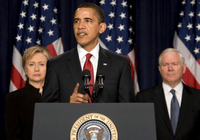A year ago, Christian Brose penned a provocative article for Foreign Policy entitled "George W. Obama." In it, the former speechwriter for Condoleezza Rice asserted that "Obama ran against a caricature of Bush's first term" during the 2008 election, rather than the Bush foreign policy of the second term. Moreover, of the latter, he predicted that Obama would "largely continue it." In large measure, Brose has turned out to be right. Despite the rhetoric of "change we can believe in," there has been a high degree of continuity between the George W. Bush and Barack Obama administrations.
Take the most significant legacy of the Bush years, the Iraq war. In 2008, candidate Obama promised, "I will bring this war to a close. In 2009, I will bring our troops home." Since taking office, however, President Obama has hewed largely to the plans laid down by his predecessor and enshrined in the 2008 "Status of Forces" agreement: U.S. forces out of Iraqi cities by summer 2010, with at least 50,000 troops to remain in Iraq until 2011 -- and Secretary of Defense Robert Gates has hinted there could be a small "residual force" left even after that date.
It is true that sometimes there has been a shift in emphasis. The Obama team placed a greater weight on trying to directly engage the government of the Islamic Republic of Iran, for instance. But as 2010 dawns, the situation is back to where it was when the Bush administration left office -- with the current administration seeking a renewed international effort to impose punitive sanctions on Tehran. The "reset" with Russia made for good rhetoric, but most of the same elements of the Bush policy that rankled Moscow have been continued, with two key examples being support for the eastward expansion of NATO -- including membership for Georgia and Ukraine -- and continued efforts to diminish Russia's stranglehold on European energy markets. Policy toward China remains largely framed by Robert Zoellick's efforts to encourage Beijing to become a "responsible stakeholder."

